What's Happening?
Australia and Papua New Guinea have signed a significant bilateral defense treaty, marking a historic moment in their diplomatic relations. The agreement, signed by Australian Prime Minister Anthony Albanese and Papua New Guinea's Prime Minister James Marape, aims to integrate the defense forces and military personnel of both nations. This treaty is Australia's only alliance-level security pact apart from the ANZUS Treaty with the United States and New Zealand. It is also the first such treaty for Papua New Guinea, a former Australian colony. The treaty includes a mutual defense obligation, similar to the ANZUS Treaty, committing both countries to act in the event of an armed attack on either nation. The treaty will come into effect once ratified by both countries' parliaments. The Chinese Embassy in Papua New Guinea has expressed concerns, suggesting that the treaty should not target or undermine any third party, reflecting China's apprehension about being excluded or targeted by such agreements.
Why It's Important?
The signing of this defense treaty is a strategic move by Australia to strengthen its security ties in the Pacific region, particularly in response to China's growing influence. For Papua New Guinea, the treaty solidifies its security partnership with Australia, while maintaining its foreign policy of being 'friends to all, enemy to none.' The agreement is significant as it represents a shift in regional security dynamics, potentially impacting China's strategic interests in the Pacific. The United States and Australia have been increasing military ties with Pacific nations to counterbalance China's influence, especially after China's security deal with the Solomon Islands raised concerns about a potential Chinese naval base in the region. This treaty could enhance regional stability and security cooperation among Pacific nations, but it also risks escalating tensions with China.
What's Next?
The treaty awaits ratification by the parliaments of both Australia and Papua New Guinea. Once ratified, it will formalize the defense commitments between the two countries. The agreement may prompt further diplomatic discussions with China, as both Australia and Papua New Guinea navigate their relationships with the major powers in the region. Additionally, Australia is negotiating a similar defense pact with Fiji, indicating a broader strategy to strengthen security alliances in the Pacific. The evolving security landscape in the region will likely lead to increased diplomatic engagements and potential adjustments in foreign policies by the involved nations.
Beyond the Headlines
The treaty highlights the complex balancing act faced by Pacific nations like Papua New Guinea, which seek to maintain economic ties with China while enhancing security partnerships with Western allies. This development underscores the geopolitical competition in the Pacific, where nations must navigate their relationships with both China and Western countries. The treaty could also influence other Pacific nations' diplomatic strategies, as they observe the outcomes of this agreement and consider their own security and economic interests.









